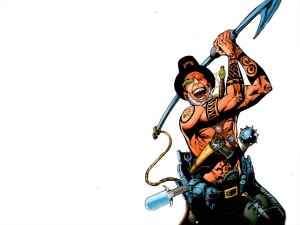Internet offers new medium for comics
Even if you think you don’t think you read comics, there’s a pretty good chance that you do. Have you ever read xkcd or Dinosaur Comics? Those are comics, even if they don’t feature superheroes or come in the regular format.
Comic books have been around since the 1930s, but the industry began experimenting with the digital medium in the last half decade.
But even if a comic goes digital, it’s still the same comic, just transferred to a different medium. Webcomics are unique; they’re created specifically for the Internet. They really took prominence as the Internet began to popularize. They became noticeable in the 1990s, and with the rise of Web 2.0, they spread like wildfire.
This introduces webcomics to a new world of possibilities. There is an interaction between the creators and readers that isn’t possible with direct market comic books. Comment sections and creator blogs let the readers and creators talk, share feedback and sometimes exchange ideas for new strips.
These comics aren’t bound by the constraints of a particular medium, such as page shapes in printed comics, so they can be anything the creators can conceptualize. That means there can be comics as simple as the repeated art found in Dinosaur Comics, or the sometimes continuity-heavy yet non-sequitor- filled Penny Arcade.
And that leaves room for experimentation in serialization. Warren Ellis, known for his transhumanist and speculative series Transmetropolitan and Planetary, ran a five year-long webcomic series called FreakAngels. In the series, released weekly in six-page installments, a group of super-powered young adults live in a post-apocalyptic London. The series was groundbreaking — fans could go to the site every week to get more than just a strip and wouldn’t have to visit a comic book store to get the latest episode. Ellis’ experiment was bold, but it worked.
But webcomics offer more than a new creative frontier; they also explore the world of business. Even with the advent of the digital market, comics are found only in very specific areas. There are only so many comic book stores — unless someone is looking for a comic, comic book apps for gadgets aren’t something people jump to. And with bookstores such as Borders going out of business, the mainstream business avenues are failing.
But with a webcomic, it’s as simple as posting a link or forwarding it to a friend. Want to share the funny xkcd comic you found? Just post it on Facebook.
It’s advertising and distribution in the age of hypersharing and memes. And instead of marketing campaigns, it’s word of mouth that drives web traffic.
In a way, webcomics are a return to the earliest stage of comics. The longer comics on the market started out as collected editions of popular newspaper comic strips in the 1930s. With print newspapers struggling in recent years, a smaller market exists for those kinds of comic stories.
But so many series adopt the aesthetics and ethos of a newspaper comic strip: plot installment or joke — however small — told in a few panels. There is no room for decompression or padding because creators are good at conveying a story in a small space. And that’s what can be found in these webcomics, even longer ones such as FreakAngels.
But how will webcomics fit into the industry? Print comics, even with a small market and the adoption of the digital field, aren’t going anywhere in the near future. And yet, webcomics are growing. Perhaps there could be a sharing of talent; comic book creators could follow Ellis’ lead and experiment with the Internet while webcomic writers could try their hand at longform series. It would certainly be interesting to see.
Comics fans have complained that writers have decompressed storytelling to pad issues out, making them better suited for the trade paperback market. Maybe the compressed, to-the-point storytelling of webcomics could liven up the print comic industry.
Are webcomics the future of comics? Most likely not, in the end-all, be-all sense. But growing along with the Internet and they have a far wider reach than the mainstream comics industry. Webcomics are a fun, new and concentrated spin on an old medium of storytelling, but they’re also experimental in a rewarding way and tend to be very entertaining.
Nicholas Slayton is a junior majoring in print and digital journalism. His column “Panel to Panel” runs Thursdays.


Comments are closed.